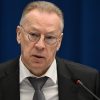 Javier Miley fired about 24,000 civil servants to rein in government spending. Photo: Zach Bennett/AFP via Getty Images
Javier Miley fired about 24,000 civil servants to rein in government spending. Photo: Zach Bennett/AFP via Getty Images
Javier Miley, Argentina's president, has disbanded a group of historians whose research led to the conviction of numerous military officers for serious human rights abuses during the 1976-1983 dictatorship.
Since 2010, the Investigations and Research Unit has scoured military archives, examining more than 17,000 documents, including the cabinet minutes of a military junta that regularly tortured and killed thousands of its leftist opponents, real and imagined.
But now Miley's government fired 10 of the 13 civilian researchers and reassigned the remaining three.
The decision potentially undermines about 30 separate ongoing criminal human rights cases that the team has been actively supporting.
Mr Miley has fired about 24,000 civil servants in a desperate attempt to rein in the situation. unrestrained government spending.
However, Defense Minister Louis Petri justified the decision, accusing the team of «McCarthyism» and targeting military personnel.
The team has built a formidable reputation for its forensic analysis of dusty archives, including revealing the junta's blacklist of artists and public intellectuals , as well as journals from the notorious Army Mechanical School, which was used as a torture center.
It is estimated that around 5,000 Argentines passed through the school before they eventually «disappeared», most of whom were dropped alive during military flights high over the South Atlantic.
The group's research led to several of these pilots being convicted three decades after committing the atrocities.
Although the president is largely uninterested in the legacy of the dictatorship, his vice president, Victoria Villarruel, has made a career of challenging the long-standing consensus in Argentina that military rulers committed crimes against humanity that should never be repeated.
Ms. Villarruel, 49, the daughter of a lieutenant colonel who rebelled against the elected government of Raúl Alfonsín in 1987, shortly after the return of democracy.
It focuses on the victims, often military personnel, of leftist rebels in the 1970s, who also used violence but whose bloodshed was subsequently eclipsed by the scale of the junta's state repression.
Human rights groups estimate the junta killed about 30,000 people, although Ms. Villarruel also disputes that figure.























































Свежие комментарии